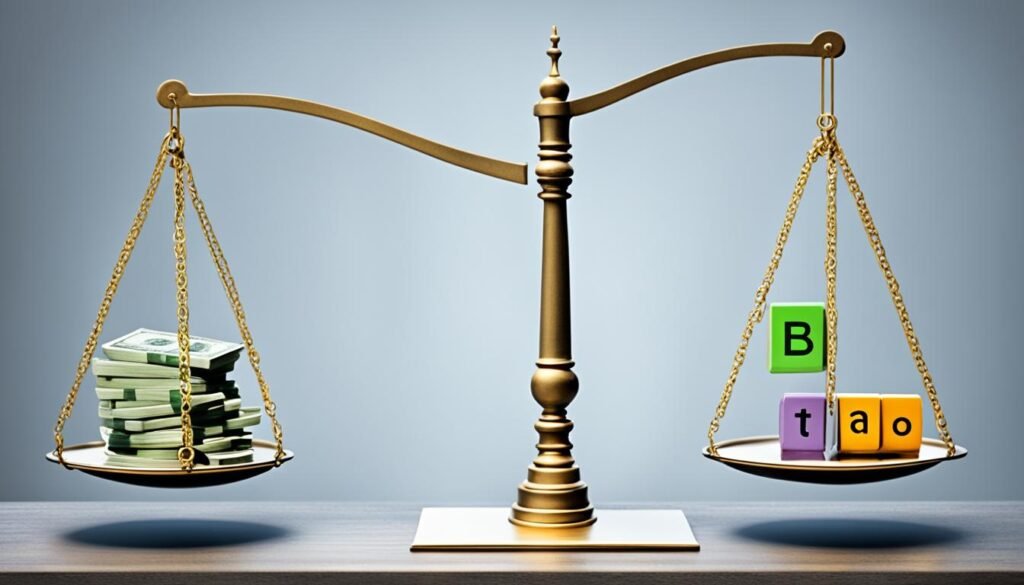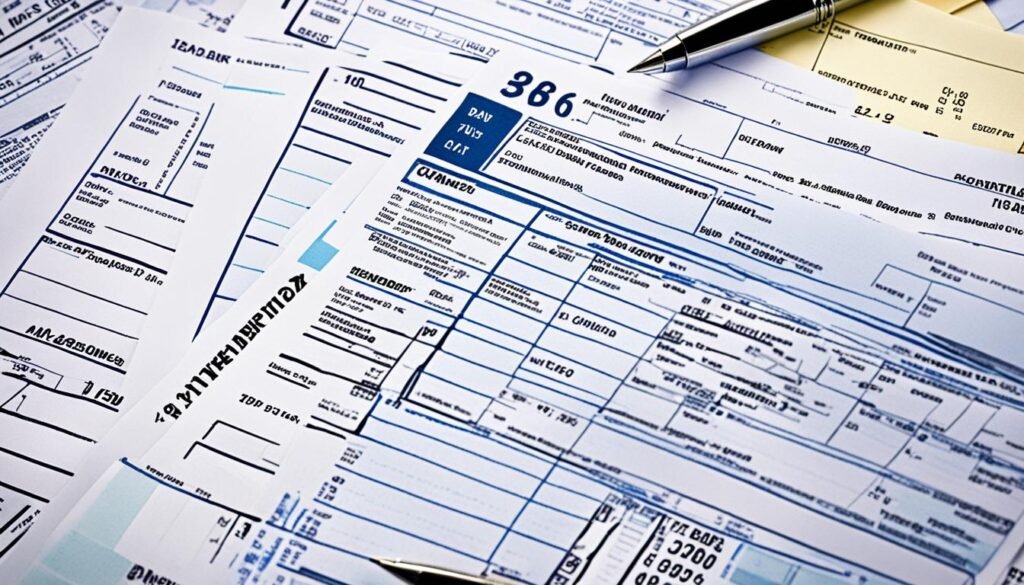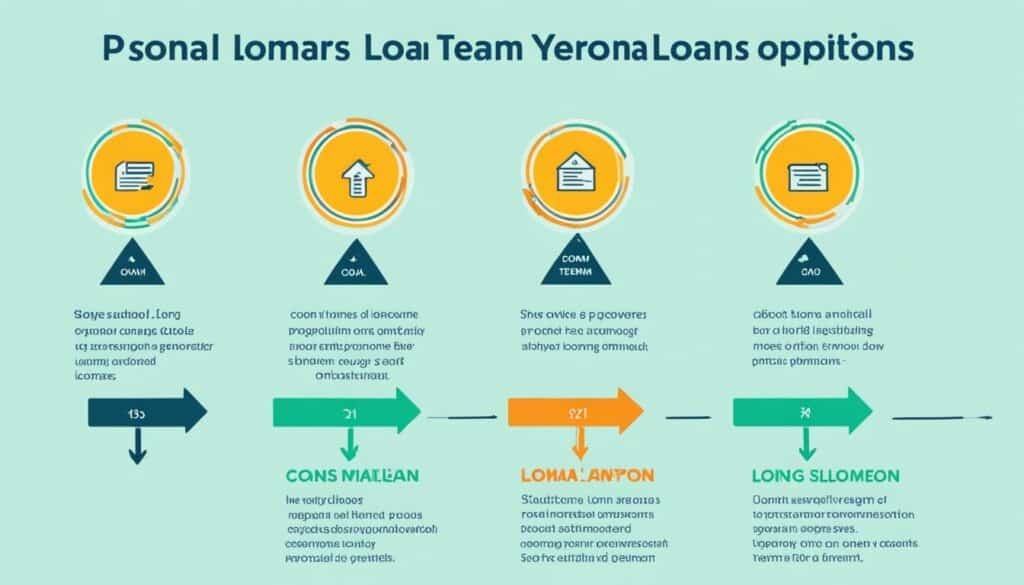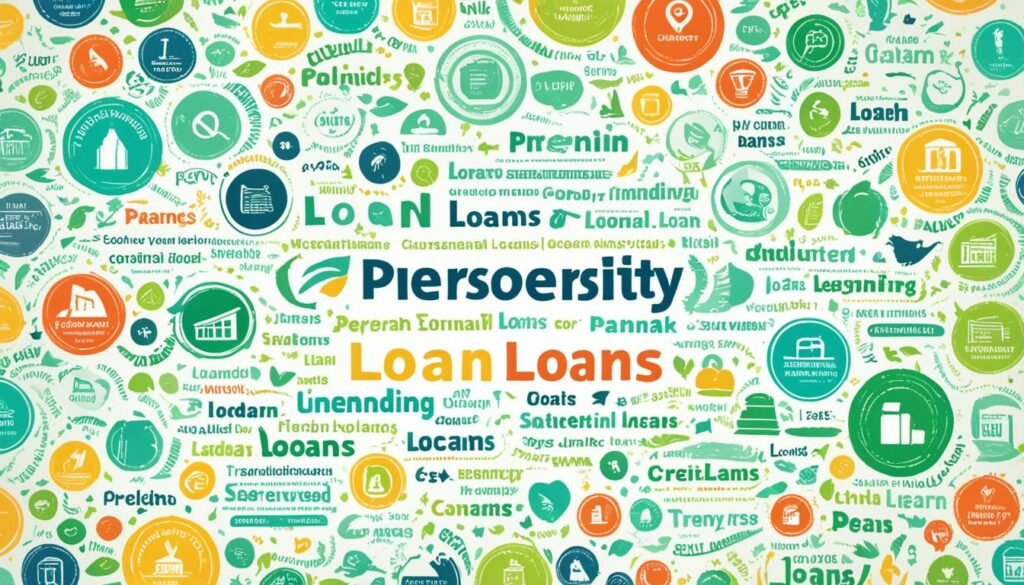A personal loan is a big financial step. It’s important to know the right steps to take. By using smart strategies, you can up your chances of getting approved. This article offers top tips to help you get the money you need.
Key Takeaways : Your Loan Approved
- Monitor your credit score and reports to identify and address any issues
- Reduce your debt-to-income ratio by paying down existing debt
- Prequalify for a loan to understand your eligibility and how it fits your finances
- Determine the right loan amount that works for you financially
- Gather all necessary documents to make applying easier
Check Your Credit Score and Reports
Before you apply for a personal loan, it’s wise to check where you stand financially. Your credit score tells lenders how likely you are to pay them back. This score is based on your credit history. So, looking into this can help you see what you need to improve. By boosting your score, you’ll look more appealing to lenders.
Monitor Your Credit for Suspicious Activity
It’s smart to keep an eye on your credit reports. This way, you can spot any mistakes or fraud that might be dragging your score down. Look at reports from the three big credit bureaus – Experian, Equifax, and TransUnion. If you see something wrong, you can ask the bureaus to fix it. This could help your credit score go up.
Improve Your Credit Score by Paying Bills on Time
One sure way to better your credit is by paying everything on schedule. How you’ve handled payments in the past is the biggest part of your credit score. So, being prompt with bills and loans is key. It shows you’re responsible and could help you get a good deal on your loan.
| Credit Score Range | Credit Score Interpretation |
|---|---|
| 800-850 | Excellent credit |
| 740-799 | Good credit |
| 670-739 | Fair credit |
| 580-669 | Poor credit |
| 500-579 | Very poor credit |
Follow these steps to work on your credit: review it, watch for odd activity, and be timely with payments. Doing so will help your loan application move into the yes pile.
“Maintaining a good credit score is essential for securing favorable terms on a personal loan.”
Also Read :Why Do I Need Health Insurances?
Understand Your Debt-to-Income Ratio

When you’re trying to get a personal loan, your debt-to-income (DTI) ratio matters a lot to lenders. It shows how much of your income goes to paying debts each month. This ratio can greatly affect if you get approved for a loan.
Knowing your DTI and working to make it better can really help. It makes the personal loan process easier.
Reduce Existing Debt to Improve Your Ratio
To make your DTI ratio better, work on lowering your debts. You can pay off credit cards fast, combine debts into a lower-interest loan, or use credit counseling. Lowering your debts means you can show lenders you can handle a new loan.
Here are some tips to cut down your debt and make your DTI look good:
- Make a budget and pay off high-interest debts first.
- Think about using balance transfer cards or debt consolidation loans for better rates.
- Ask your lenders for lower interest rates or better payment options.
- Use debt management programs or credit counseling to plan your debt paying.
By using these methods to cut down your debt, you can improve your DTI ratio. This, in turn, helps you get a personal loan with better terms.
| Debt-to-Income Ratio | Loan Approval Likelihood |
|---|---|
| 35% or less | Excellent |
| 36% to 49% | Good |
| 50% or more | Poor |
Your DTI ratio is key to getting a personal loan. It’s very important to work on lowering your debts. This makes you more likely to get the loan you want.
Also Read :How Do I Find The Best Insurance Policy For Me?
Prequalify Before Applying

Prequalifying for a personal loan before applying can save you time and effort. It involves a soft credit check that doesn’t hurt your credit score. You can then check out different lenders to see who offers the best rates and terms.
By prequalifying, you understand the loan options and rates available to you. This knowledge will guide you in making a better decision when you apply for the loan. It also prevents the letdown of being rejected after a full application.
There are several good reasons to prequalify for a personal loan:
- Soft credit check – Prequalification includes a soft credit check that won’t damage your credit score. It means you can shop around freely.
- Compare multiple lenders – Prequalifying lets you compare offers from different lenders to get the best deal for you.
- Estimate loan eligibility – It helps you get an idea of the loan amount and interest rate you might secure.
- Streamline the application – Once you’re ready, the details from prequalification can fast-track your full loan application.
Prequalifying helps ensure you select the best possible personal loan for your financial situation.
| Lender | Prequalified Rate | Prequalified Loan Amount |
|---|---|---|
| Bank A | 7.5% | $20,000 |
| Lender B | 8.2% | $18,000 |
| Credit Union C | 6.9% | $22,000 |
By prequalifying, you can easily compare the loan options and find the best fit for your financial situation without impacting your credit score.
Also Read : How To Get The Best Auto Loan
Determine the Right Loan Amount

When you get a personal loan, it’s key to pick the right amount. This amount should match what you earn and make sure you can pay it back. A personal loan calculator is very useful here. It helps figure out the loan size you can handle. It looks at your income, debts, and credit to guess how much you can borrow.
Use a Personal Loan Calculator
A personal loan calculator is great for making smart loan choices. It considers things like how much you want to borrow, the interest rate, and how long you’ll take to pay back. By putting in this data, it tells you if you can get the loan. It also says how much your monthly payments might be.
This tool keeps you from taking on more debt than you can manage. Sticking to a loan you can easily repay avoids money stress. By figuring out the best loan size early, you make a wise choice and skip future troubles.
| Loan Amount | Interest Rate | Loan Term | Monthly Payment |
|---|---|---|---|
| $20,000 | 10% | 3 years | $612 |
| $30,000 | 12% | 5 years | $654 |
| $40,000 | 14% | 7 years | $673 |
The table above shows how a personal loan calculator can guide you. By changing the loan amount, interest rate, and payback time, you find what works for your budget.
“Using a personal loan calculator is an essential step in the loan application process. It helps you make a well-informed decision and avoid overborrowing.”
Also Read :How Does Pet Insurance Work?
Gather Required Documentation

When you apply for a personal loan, the lender will ask for proofs of your identity, income, and where you live. Having these personal loan application documents ready makes getting your loan easier.
Start by showing proof of identity. You can use your driver’s license, passport, or state ID. Then, prove your income with things like pay stubs, tax returns, or bank statements.
If you work for yourself or your income changes a lot, you might need extra info. This could be business paperwork or financial reports. All these documents help the lender see if you can pay back the loan.
Finally, show where you live. You can do this with a utility bill, lease, or recent bank statement. Keeping these papers handy speeds up your loan application.
| Document | Purpose |
|---|---|
| Driver’s License or Passport | Verifying identity |
| Pay Stubs or Tax Returns | Verifying income |
| Utility Bill or Lease Agreement | Verifying address |
Getting your personal loan application documents ready early can make things go smoother. Remember, showing lots of clear income and identity proof is key to a good application.
Also Read :What Is An Installment Loan?
Your Loan Approved

Congratulations on getting your personal loan approved! Now, you might wonder what made the lender say yes. They checked your income, how you’ve handled credit before, and your overall trustworthiness with money. Knowing these helps you borrow wisely, aligning your choices with what’s best for your wallet.
Income and Credit History
To lenders, what you earn and how you’ve managed money in the past are super important. Your income shows you can pay back what you owe. Meanwhile, your credit history looks at how well you’ve handled money in the past. Having a high credit score and little debt compared to your income paint you as a good risk, making you more likely to get approved.
It’s key to keep your credit solid and manage debts well if you want a personal loan. This means never being late on payments, not using up too much of your credit limits, and not applying for a lot of new credit.
“Understanding the factors that influence personal loan approval can empower you to make informed financial decisions and increase your chances of securing the financing you need.”
Lenders might also look at how long you’ve been at your job, if you offer anything valuable as backup for the loan, and your complete financial picture. Being mindful of these details prepares you better for a successful loan application, putting you in charge of your financial tomorrow.
Keep in mind, each lender may consider different things based on their own rules and what’s unique about your financial situation. Always compare what’s out there, understand clearly what you’re agreeing to, and see if it fits your financial plan before saying yes to a loan.
Also Read :What Is A Loan Disbursement?
Choose the Right Loan Term

When you pick a personal loan, think carefully about the term. Lenders offer terms from 1 to 3 years up to 5 to 7 years. It’s key to consider your budget and financial goals to match the loan term with your needs.
Weigh Short-Term vs. Long-Term Options
Deciding between short-term vs. long-term personal loans involves tradeoffs. Let’s examine the main differences.
- Short-Term Loans: These run from 1 to 3 years with less total interest but higher monthly payments. Pick this if you can easily afford the big payments and want to clear your debt quickly.
- Long-Term Loans: Spread over 5 to 7 years, these loans have lower monthly payments but you will pay more interest over time. Choose this for more budget flexibility.
When looking for the right personal loan term options, think about your financial situation and goals. Use a loan calculator to see how different term lengths affect monthly payments and total interest. This helps you pick an option that fits your needs.
“Carefully evaluating short-term vs. long-term personal loan options can help you find the right balance between monthly affordability and overall interest expenses.”
Explore Different Loan Types

Various types of personal loans exist. Each has unique features and requirements. By knowing these differences, you can find the best fit for your needs.
Unsecured Loans vs. Secured Loans
Unsecured loans don’t need any collateral, like your home or car. They depend on your credit score and how much you earn. Secured loans, however, do need collateral. This can get you a lower interest rate but risks your possession if you don’t pay.
Debt Consolidation Loans
A debt consolidation loan combines many debts into one, easy to manage payment. It can make repaying simpler and might reduce your interest rate. This helps you pay off debt more smoothly.
Consider your financial situation and what you want to achieve. Each loan has its own benefits and drawbacks. Choosing the right one is key to your financial success.
“The right personal loan can help you achieve your financial objectives, whether it’s consolidating debt, financing a major purchase, or addressing an unexpected expense.”
When looking at different loans, always research the lender. Compare rates and fees. Make sure you know and are okay with the terms before choosing. This careful process can lead you to a loan that helps you reach your financial goals.
Improve Your Chances With a Co-Signer

Adding a co-signer can boost your chance of getting a personal loan, especially with a weak credit. But, this move needs serious thought. The co-signer shares the repayment duty and the risks.
This sharing has upsides:
- It boosts your credit and financial status when applying.
- You might get a loan with better terms or a lower rate.
- Your chances of loan approval go up.
But, there are big risks too. If you don’t pay, the co-signer faces debt and credit troubles. This might hurt your relationship and their finances.
| Advantages of Co-Signing a Loan | Disadvantages of Co-Signing a Loan |
|---|---|
|
|
Before you and a co-signer agree, talk about everything openly. Make sure both of you fully get the risks and duties. Look into other paths like involving a different lender or going for a secured loan. This way, you can enhance your loan approval odds without the heavy risks of co-signing.
Also Read : Citi Personal Loans: Quick & Easy Financing Options
Conclusion
Getting a personal loan may seem tricky, but sticking to the advice in this guide can make it easier. First, keep an eye on your credit score and debts. Prequalify to see what you can get, and pick a loan amount and term that fits your needs. These steps can guide you through and improve your chances.
Work on your credit and lower what you owe. Learn what lenders look for to make your application stronger. Also, look at different types of loans and what terms suit you best. Doing this puts you in a good place to get approved.
Getting a personal loan is a big deal, so being careful and thorough is key. Stay ahead by being ready and informed. This way, you’re more likely to get the loan that helps you meet your goals and makes your financial life better.
FAQs
What are the key factors lenders consider when evaluating a personal loan application?
Your credit score and history, the money you owe versus your income, and how trustworthy you are with credit all matter. This is crucial when you’re looking to get a personal loan.
How can I improve my chances of getting a personal loan approved?
To boost your chances, keep a close eye on your credit report. It also helps to lower any existing debts you have. It’s smart to get prequalified before applying and to choose a loan that fits your budget.
What documentation is required for a personal loan application?
When applying for a personal loan, you’ll need to show who you are, how much you make, and where you live. This means proving your identity, showing your income, and verifying your address.
How does the choice of loan term impact the personal loan approval process?
When picking a loan term, you’ll see many options, from 1 to 7 years. It’s wise to think about the monthly payments and interest costs for each one. This will help you find a term that matches your financial situation well.
What are the different types of personal loans available?
There are personal loans that are not tied to any asset (unsecured) and those that are (secured). Plus, there are loans specifically for combining multiple debts. Each type has its unique traits and who can apply for it.
How can adding a co-signer improve my chances of getting a personal loan approved?
Having someone with good credit cosign on your loan can be a big help. It’s especially useful if your own credit isn’t very strong. But, remember that there are serious things to think about when you ask someone to cosign for you.
Source Links
- https://www.bankrate.com/loans/personal-loans/how-to-get-personal-loan/
- https://www.forbes.com/advisor/in/personal-loan/10-tips-to-increase-your-chances-of-getting-a-personal-loan/
- https://www.lendingtree.com/personal/improve-chances-getting-approved-personal-loan/




